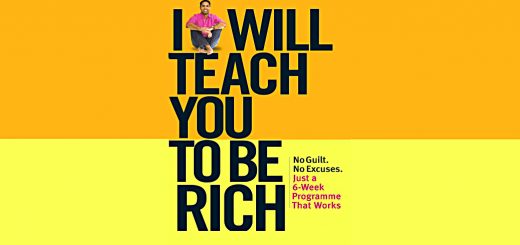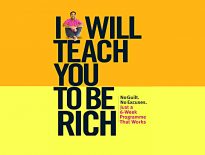I Will Teach You To Be Rich 1 – Credit

Today’s post is our first visit to a new book, the popular I Will Teach You To Be Rich by Ramit Sethi.
Contents
I Will Teach You to Be Rich
I don’t know much about Ramit or his book, other than:
- It pops up on the internet a lot
- I think Rami was pretty young when he wrote the book (straight out of Stanford in fact – not usually a good thing).
But from the title, it sounds like its heart might be in the right place, so let’s approach it with an open mind.
Before his book, Ramit had a website of the same name, which dates back to 2004.
- So he’s a personal finance blogger made good.
It’s no surprise to me – as someone with a complicated website – that the guys who have a simple message are the ones that make the big bucks.
- Ramit says it took him two years to turn his blog posts into a six-week self-help programme (in the shape of a book).
And after the book was a success, he (and his publishers) went to the trouble of making a UK-specific edition, which is the one that I’m looking at.
The only US terms we need to remember are:
- 401(k) = company pension (auto-enrolment workplace pension these days)
- IRA = something like an ISA
- “Roth” versions of these have US tax incentives (as it seems the defaults don’t).
Ramit notes that US youngsters (his target audience) are more comfortable with stock market investing than their UK counterparts.
- He’s definitely right about that, though providers like Vanguard and Freetrade are making a difference.
Rami got interested in investing when he lost half of a college scholarship through investing badly.
- So he did some research in order to avoid repeating the mistake, which turned into informal classes for his friends at college, then the blog and then the book.
And he also does public speaking these days – which is somewhat worrying.
The basics
Here are his basic rules:
- Getting started is more important than being the smartest
person in the room.- It’s OK to make mistakes.
- Read a lot so you know when to call BS, but not too much–
action is more important than reading.- Ordinary actions get ordinary results.
- There’s a difference between being sexy and being rich.
Not much to argue with there.
And most importantly:
If you expect to get rich quick, go find another book.
There is no get rich quick secret here.
Spend vs save
In his introduction, Ramit gets straight into the “spend vs save” discussion:
Unlike other personal-finance pundits, you won’t find me wagging my finger, telling you to save on everything and count the number of grains of rice you can eliminate when cooking.
I encourage you to spend extravagantly on the things you love – if you can cut costs mercilessly on the things you don’t.
That sounds great, but in general, you can’t have both.
- Of course, this could just be a cool way of saying set yourself a budget and stick to it.
It’s true that the universe is not taking note of WHAT you spend money on, but HOW MUCH you spend will make a big difference to your future.
Weight control
Ramit draws an analogy between finance and weight control – one that I like to make myself.
When you ask people who have put on weight after college about weight loss, they tend to talk about minutiae (whether carbs are ok, and what time of day to eat).
- People love anecdotal evidence and fashionable concepts.
But in fact, the way to lose weight is to eat less and move more (particularly the first).
- In the same way, finance is all about spending less than you earn and investing the surplus in some appropriately risky (and hence high-returning) assets.
Hot stocks and the best interest rate for your cash won’t get you far in the long run.
- Any more than debating the Atkins diet will make you thin.
It’s more important to get started (and keep going) than to debate the best course of action.
Let the fools debate the details. I decided to learn about money by taking small steps to manage my own spending.
You don’t have to be an expert to get rich. You do have to know how to cut through all the information and get started.
Reasons not to do anything
In the next section, Ramit looks at why (young) people are put off doing anything about their finances.
1 – Too much information, which leads to analysis paralysis.
- More funds in a pension scheme lead to more people not choosing any fund, and to more people choosing ultra-conservative money-market funds.
- This is a problem because starting early is a great advantage (because of compounding) – you’ll struggle to make up the missed decade between ages 25 and 35.
2 – The financial media aims at (and is written by) old white men, according to Ramit.
- Maybe this was true back in 2008, but it certainly isn’t now.
- Looking through the other end of the telescope, however, old white men still seem to be the people most interested in finance.
- In order to attract young, non-white, non-men the subject matter in most publications has been dumbed down extensively over the last decade. (( Disclosure: I am an old white man ))
According to Ramit:
We [young people] care about knowing where our money’s going and redirecting it to go where we want it to go. We want our money to grow automatically, in accounts that don’t nickel-and-dime us with fees. And we don’t want to have to become financial experts to get rich.
Which is fine, but that stuff takes about 30 minutes to explain – and then what do you write about on a long-running blog. (( Seven years and counting, in my case ))
3 – Financial education is poor
- Ramit says that in fact, most US colleges do offer personal finance courses.
- I think the UK is still a bit behind here, but more importantly, I don’t think most college-age people are interested.
- I think of myself as an early adopter in this area, and even I didn’t start to invest until I was 24 (after college).
4 – Financial corporations want to profit from you
- Duh. So does every corporation (and actor and singer and sports star). Deal with it.
5 – “I’m afraid of losing money.”
- This is a good one, and I have to admit that I’m still afraid of losing money.
- But by trying to avoid all risks, you will end up with less money in the long term.
6 – “I can’t find an extra £100 per month.”
- I have to part company with Ramit on this one.
- He says it can be less than £100, I think it needs to be more like £500 per month in order to set yourself on the road to financial independence (FI).
Small steps
But of course, getting started with any amount is better than doing nothing.
The thing is to get started – you don’t need all the answers right away.
I believe in small steps. I want to reduce the number of choices that paralyze us. So instead of saying, “How much money do I need to make?” you’ll say, “What do I want to do with my life – and how can I use money to do it?”
Ramit calls his way “The 85 Percent Solution”.
Ordinary
Ordinary actions get ordinary results. Yet more than half of college graduates said they plan to be millionaires by the age of forty. To be extraordinary, you don’t have to be a genius, but you do need to take some different steps.
By which he means primarily investing from an early age.
Sexy or Rich?
Investment isn’t about being sexy – it’s about making money.
Ramit is a big fan of buy-and-hold, which is a fine strategy in theory, but one which becomes progressively more difficult to stick to as your wealth increases (and the downturns hit you much harder).
Spend extravagantly on the things you love, and cut costs mercilessly on the things you don’t.
Again fine, so long as the bottom line puts you on track for your long-term goals.
Ramit uses the “stop buying lattes” exhortation as an example of what he won’t say – but there’s not much more obviously stupid than buying over-priced (and in the case of lattes, awful) coffee when your finances are not in order.
It’s easy to want the best of everything. The truth is, you have to prioritize.
Or as we used to say, you can have anything that you want. But you can’t have everything that you want.
Why Do You Want to Be Rich?
Ramit recommends that you figure out why you want to be rich before you start.
I can’t see the need to move beyond financial independence, which is the freedom to spend your time doing what you please.
- Note that this takes a fair amount of cash, and is hard to achieve over a short space of time.
Credit
Chapter one is about credit cards, which are not a topic that I’ve given much thought to.
Ramit is Indian and explains that in his culture, haggling over price is commonplace.
- He tells the story of getting auto dealers to bid against each other for his first car.
Though he got a good price, in the end, his credit “didn’t have enough sources” and he ended up paying too much for finance.
Ramit is leading up to us fixing our credit, but before that, never buy a depreciating asset on credit.
- Credit cards are fine so long as you pay the balance each month, but debt is strictly for buying the house that you live in.
Student debt is a special form of debt, in that it gets cleared after a certain period of time and is charged as a tax against income over a certain level.
- This could mean that you should be in no hurry to clear it (most people won’t earn enough to need to do so).
But if you have student debt, you should do a detailed calculation yourself to make sure.
Credit reports
Credit reports were never important when I was growing up.
- But then again, I’m not a big user of credit.
I’ve had two mortgages against different houses (each paid off).
- I’ve also bought five cars over 35 years, but every time with cash.
My salary has been important when taking out a mortgage, but I don’t think that I’ve ever been turned down for a credit card.
- I have three at the moment, with a combined limit of £20K (which I never come close to using).
But according to Ramit:
Our largest purchases are almost always made on credit, and people with good credit save tens of thousands of pounds on these purchases.
I think this is pretty dangerous advice.
- Don’t buy things on credit.
Credit scores
Ramit says your credit score depends on:
- payment history (reliability of on-time payments)
- stability (age, length of time at address, rent vs own)
- court judgements against you (plus fraudulent applications sent from your address by anyone, and “gone away” issues)
- activity (including credit inquiries – it’s good to use a little credit and pay it back each month)
- other things – postcode, marital status, relationship with the lender, salary
It used to be difficult to find out your credit score, but now lots of apps will do this for you.
Building credit
To be fair to Ramit, the next section points out how expensive credit cards are over the long term, using a “moderate” interest rate of 16% APR.
- But if you pay your bill on time, they offer a free short-term loan – plus 0.5% cashback if you shop around.
Ramit has a section on how to pay down credit card debt.
- But I’m going to assume that readers of this blog are unlikely to have allowed it to spiral out of control in the first place.
The main choice is between the highest APR first (economic rationality) and smallest balance first (psychologically boosting and known as the snowball method – which is strange, since the outstanding balance is getting smaller).
Ramit is not a fan of cashback, preferring travel rewards.
- I don’t like non-fungible rewards, and post-Covid, travel points don’t look great.
- But you might be able to find a card with rewards that you value.
Credit cards also provide consumer protection for large purchases (above £100 and below £30K) on top.
- And using them apparently improves your credit score.
For those with low/no income, there are specific credit building cards available (with punitive interest rates, but these won’t matter if you pay your bill each month).
Ramit’s credit card rules
- Set up an automatic payment (direct debit) so that you are never late.
- Try to get fees refunded.
- Negotiate a lower APR.
- Keep your cards for a long time and keep them active.
- Get more credit.
- Use your rewards (which is easy if they are cash).
Good luck with some of these (2 and 3).
Ramit says this about number 5:
If lenders can see that their competitors have given you credit and you haven’t fully used your card up to its limit, they will feel more comfortable about extending more credit to you.
I think you have bigger fish to fry than worrying about credit cards.
- Get the one with the highest cashback and pay it off every month.
That’s about it on credit cards, and where we’ll leave things for today.
- We’re about 20% of the way through the book, so I’m expecting another four articles in this series, plus a summary.
Up next are bank accounts, pensions and ISAs.
- Until next time.















